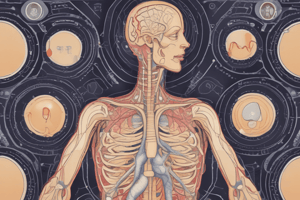Podcast
Questions and Answers
Which gland is referred to as the 'master gland' of the endocrine system?
Which gland is referred to as the 'master gland' of the endocrine system?
- Pituitary Gland (correct)
- Thyroid Gland
- Parathyroid Gland
- Adrenal Gland
Epinephrine is a hormone that has a short-lasting effect in the body.
Epinephrine is a hormone that has a short-lasting effect in the body.
False (B)
What is the function of the adrenal cortex?
What is the function of the adrenal cortex?
Regulates salt and carbohydrate metabolism
The __________ regulates water and salt balance in the body.
The __________ regulates water and salt balance in the body.
Match the following hormones with their function:
Match the following hormones with their function:
Flashcards are hidden until you start studying
Study Notes
Hormones Overview
- Hormones are chemical substances produced by endocrine glands and released into the bloodstream.
- They influence brain function and other body tissues.
- Adrenaline (epinephrine) elevates heart rate, blood pressure, blood sugar levels, and promotes feelings of excitement during emergencies.
- Hormones act slower than neurotransmitters, which signal quickly through neurons.
Comparison: Hormones vs. Neurotransmitters
- Hormones are released into the bloodstream by glands, while neurotransmitters are released in the brain by neurons.
- Hormonal effects are long-lasting, while neurotransmitter effects are shorter.
- Examples include epinephrine (slow-acting hormone) and norepinephrine (fast-acting neurotransmitter).
The Endocrine System
- The Endocrine System functions as the body's "slow" chemical communication network through hormones.
- It comprises various glands responsible for hormone synthesis and release.
Key Glands of the Endocrine System
-
Pituitary Gland
- Known as the "master gland" because it regulates several other endocrine glands.
- The anterior lobe releases hormones that control activities of other glands; the posterior lobe manages water and salt balance.
-
Thyroid & Parathyroid Glands
- Manage metabolic rate and calcium levels in the body.
-
Adrenal Glands
- Consist of two main parts: adrenal medulla and adrenal cortex.
- The adrenal medulla secretes stress hormones (epinephrine and norepinephrine) in response to emotional and stressful triggers.
- The adrenal cortex regulates salt balance and carbohydrate metabolism.
-
Gonads
- The sex glands, located differently in males and females, regulate bodily development and sustain reproductive organs in adults.
Studying That Suits You
Use AI to generate personalized quizzes and flashcards to suit your learning preferences.




